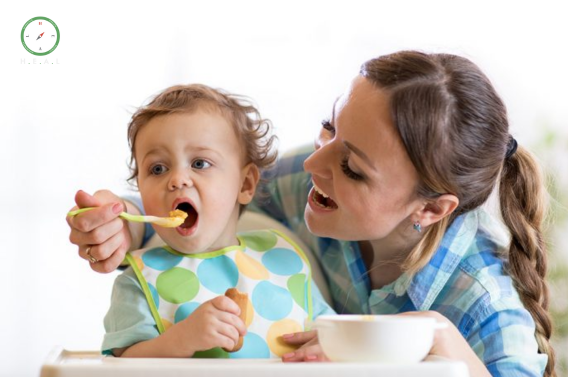The journey of introducing solid foods to a baby is a significant milestone in their development. In recent years, the concept of baby-led weaning has gained popularity as a more natural and child-led approach to starting solids. In this blog, we will delve into the specifics of baby-led weaning practices in India, considering the cultural and dietary aspects unique to the country.

Baby-led weaning (BLW) is an approach to introducing solids to infants, where the baby is allowed to self-feed from the very beginning, typically around six months of age. This method promotes the idea of allowing the child to explore and enjoy a variety of foods at their own pace, as opposed to the traditional spoon-feeding approach.
Baby-led weaning in India is gaining popularity among parents who appreciate the idea of fostering independence and allowing babies to experience diverse and flavorful Indian cuisine. Here are some key considerations for practising BLW in India:
1. Introducing Spices:
Indian cuisine is known for its rich and diverse use of spices. When practising BLW in India, parents can gradually introduce mild spices like turmeric, cumin, and coriander to expand their baby's palate and help them become accustomed to the flavours of the local cuisine.
2. Cultural Foods:
Indian households often prepare a wide range of cultural foods. Parents can introduce traditional dishes such as khichdi, idli, dosa, and various vegetable preparations as part of their baby's diet, as long as they are appropriately modified for their age and dietary needs.
3. Finger Foods:
BLW emphasizes the use of finger foods, and Indian cuisine provides a plethora of suitable options. Foods like soft roti, poha, and rice cakes can be easily incorporated into a baby's diet.

4. Safety and Allergies:
Safety is paramount in baby-led weaning. Parents should be cautious about choking hazards and allergies. It's important to avoid honey, whole nuts, and certain allergenic foods until the baby is older. Always supervise meal times.
5. Breastfeeding Continuation:
While introducing solids, it's crucial to continue breastfeeding as it remains a significant source of nutrition for the baby.
Suitable foods for baby-led weaning should be soft, easy to grasp, and minimally processed. Some great options include steamed vegetables like carrots and broccoli, ripe fruits such as banana slices, soft-cooked pasta or rice, and small pieces of avocados or tofu. These foods not only provide essential nutrients but also allow babies to practice their fine motor skills and develop a taste for a variety of flavours and textures.
Baby-led weaning practices in India encounter several unique challenges. Firstly, a lack of awareness about this method remains a significant hurdle, as many parents are more accustomed to traditional spoon-feeding approaches. Moreover, there is often pressure within some Indian communities to initiate solids earlier than the recommended six-month mark, which can clash with the BLW philosophy of waiting for developmental readiness. Hygiene concerns can be an issue, as maintaining impeccable food safety standards can be challenging in certain regions. The influence of family expectations and beliefs, along with a limited availability of suitable finger foods, can further complicate the adoption of BLW. Additionally, the risk of introducing allergenic foods and the social stigma against unconventional feeding practices can pose considerable challenges for parents looking to embrace baby-led weaning in India.

The popularity of Baby-led weaning in India can be attributed to several factors that have contributed to its gradual acceptance and adoption in recent years:
Global Influence: BLW gained popularity in the Western world and gradually spread to other countries, including India. As information became more accessible through the internet and social media, Indian parents began to explore this alternative approach to introducing solids.
Parenting Communities:
Online parenting communities and forums played a crucial role in promoting BLW in India. Parents sharing their experiences, success stories, and advice on platforms like Facebook, WhatsApp groups, and parenting blogs helped others learn about the method.
Educational Resources:
Several books and websites dedicated to BLW, along with Indian parenting blogs and YouTube channels, started providing information, tips, and guidelines on how to implement BLW safely in an Indian context. This information helped parents understand the approach better.
Pediatrician Support:
Some Indian paediatricians who were open to alternative weaning methods began recommending BLW to their patients. This professional endorsement increased awareness and trust in the method.

Desire for Healthier Eating Habits:
Many Indian parents recognized the potential benefits of BLW, such as fostering healthier eating habits, independence, and a broader palate. This aligns with the increasing emphasis on health and nutrition in modern parenting.
Baby-led weaning in India is an exciting approach that aligns with the rich and diverse culinary traditions of the country. Parents who choose this method can introduce their little ones to a wide array of flavours and textures, fostering a love for Indian cuisine and encouraging independence from a young age. While there are challenges, the growing awareness and support for baby-led weaning in India are promising signs for the future of this child-led feeding approach.
Vidhi Beri is a renowned Global Educator and Specialist in the fields of Holistic Health, Lactation, Maternal Health Wellness, Child Nutrition, and Children's Milestone Development with effective and well-structured maternity wellness programs offered to the new wave of freshly home-grown Indian mommies and babies, with her desi tadka of Ancient Indian sciences in her latest book, Decoding Motherhood, one of the best Maternity books India. Visit Vidhi Beri’s official website to know more- https://www.vidhiberi.com/.